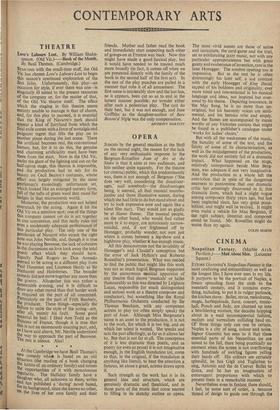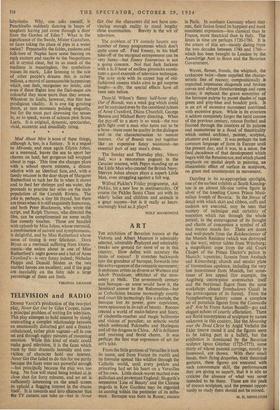CINEMA
Neapolitan Fantasy. (Marble Arch Pavilion.)—Mad About Men. (Leicester Square.)
Erroair GIANNINI'S Neapolitan Fantasy is the , most confusing and extraordinary as well as the longest film I have ever seen in my life. It purports to be the portrait of Naples, a fresco spreading from the sixth to the twentieth century, and it contains every- thing, including, to put it in vulgar parlance, the kitchen stove. Ballet, revue, melodrama, magic, harlequinade, farce, concert, music- hall, Punch and Judy, are churned up into a bewildering mixture, the decades hopping about in a mad inconsequential fashion, realism and surrealism colliding head on. Of three things only can one be certain. Naples is a city of song, colour and noise. Signor Giannini has seen to it that these essential parts of his Neapolitan ice are tasted to the full, there being practically no moment when the screen is not overflowing with hundreds of swirling figures yelling their heads off. His colours are certainly splendid, he has Gigli and Tagliabue to sing, Antonio and the de Cuevas Ballet to dance, and he has an imagination of extravagant proportions with which to present them in a remarkable manner.
Nevertheless even in fantasy there should, I feel, be some sort of order, a tenuous thread of design to guide one through the labyrinths. Why, one asks oneself, is Punchinello suddenly dancing in heaps of spaghetti having just come through a door from the Garden of Eden ? What is the significance of the. Swede, Mister Gustafson, or faces taking the place of pips in a water melon? Presumably the fables, customs and folk-lore of Naples have some bearing on such matters and maybe to the Neapolitans all is crystal clear, but to us much of the madness is meaningless, the symbolism misses its mark. Like listening to the tale of other people's dreams this is rather tedious, a record of unreasonable happenings which, one feels, recognises no limits, and even if these flights into the Dali-esque are colourful they tease more than they amuse. Whatever its faults, however, this film has prodigious vitality. It is one big gyrating throb, at rare moments pulsing elegantly, but for the most part drowning the senses in, so to speak, waves of salmon pink Santa Lucia. It is original, dynamic, spectacular, vivid, eccentric and dreadfully tiring.
Mad About Men is none of these things, although it, too, is a fantasy. It is a sequel to Miranda, and once again Glynis Johns, as a mermaid, leaves the sea to sport her charms on land, her gorgeous tail wrapped about in rugs. This time she changes place with a school sports mistress, a distant relative with an identical face, and, with a family retainer in the dear shape of Margaret Rutherford to tuck her fin in when it shows and to feed her shrimps and sea water, she proceeds to practise her wiles on the male population of the Cornish Riviera. The joke is, perhaps, a tiny bit frayed, but there are times when it is still exquisitely humorous, and both Peter Blackmore, who wrote the script, and Ralph Thomas, who directed the film, can be complimented on some really fine comedy touches. These are handled with aplomb by Miss Johns, whose mermaid, a combination of naiveté and nymphomania, is delightful, and by Miss Rutherford whose sense of timing is ever felicitous. Dora Bryan as a mermaid suffering from klepto- mania—she swims about in one of Miss Rutherford's night gowns and a hat of Anne Crawford's—is very funny indeed; Nicholas Phipps and Donald Sinden as the two startled heroes are excellent; and if the gags are inevitably on the fishy side a large percentage of them are fresh.
VIRGINIA GRAIIAM



































 Previous page
Previous page